by Glenn | Mar 10, 2012 | MIA, Writing
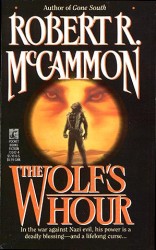
In Part 1 I discussed the highly acclaimed author Nicholas Guild being MIA, Missing in Action, from the literary world since 1995. He seemingly vanished without word to his readers and to this day has not returned to his writings. Along with Mr. Guild, I mentioned another well published author that walked away from his profession. His name is Robert R. McCammon. Fortunately for readers he returned, and has since been diligently churning out great works as before. Although he’s off the MIA list, I want to discuss his absence.
Nicholas Guild and Robert McCammon, as I previously wrote, unknowingly were my mentors. Two other authors, Wilbur Smith and David Morrell, were major influences on my writings as well. But Guild showed me through “The Assyrian” how historical fiction should truly be written, and from McCammon’s “The Wolf’s Hour,” I studied and learned so much about the craft of writing.
Born in July of 1952 (a month before me) McCammon received a BA in Journalism from the University of Alabama in 1974. While he was in college and beginning his writing career, I had been to Vietnam, was being discharged from the Corps and starting on the streets as a police officer. A highly acclaimed, award-winning, international author, he wrote from 1978 to 1991, stopped for 10 years and returned in 2002 to his writings. While searching a list of his achievements, I lost count at 23 novels, assortment of collections, anthologies, and essays. Have you ever heard of the prestigious “Bram Stoker Award?” Well, McCammon had the idea to start the Horror Writers Association where the award was born. (Aspiring horror writers owe him more gratitude than they will ever realize.)
While he was turning out his first string of published books, I was banging my head against the wall trying to complete my first book. A well-published friend and I were having a relaxing afternoon talk about writing and the industry when she handed me a book and said, “Read this then read it again if you want to learn the craft.” That was my introduction to McCammon’s “The Wolf’s Hour” (pub: 1989.) I looked at the paperback and thought she had gone crazy. A man is a werewolf who is a spy who fights Nazi’s in World War II. But my friend never steered me wrong in the past and certainly had not this time. “The Wolf’s Hour” was tightly written, had excellent action and dialogue, was an intense read, and it immediately became my craft textbook.
Even though I consider him to be my craft mentor, I’ve never met him nor have I read all of his works. One day at a bookstore I heard he was no longer writing. I checked with friends who advised me they heard through the publishing grapevine there were problems and he chose to stop. Not having an Internet to search for information as we do now, I let the matter drop. I had stopped my writings as well, (no need to rehash it, see Micheal Rivers.com interview) and so I was left with only my well-worn copy of “The Wolf’s Hour.”

The average person goes to a bookstore, finds a shelf lined with their favorite author’s novels and thinks, “Wow, they have the easy life! They just write books and don’t have to bust their butts like regular people do every day!” The perception is a make-believe world, fantasy at its best. Even today, my closest, non-writer friends have little concept of how much effort I put into writing a novel.
Highly acclaimed authors such as McCammon are placed on pedestals, separated from us common mortals. Their fingers upon a keyboard have a Midas touch and they do not suffer with daily headaches and concerns as ‘we’ do. Well, along with dressed-up rabbits laying colorful eggs at Easter, this is another misconception. (Everyone knows rabbits don’t dress-up.)
Recently, after searching for information on Guild and finding limited articles, I grew more curious about McCammon’s absence. I located his website. Everything I wanted to know was there, written by him, straight from the horse’s mouth, so to speak. I discovered other sources of information but primarily remained with his personal writings—because they were from the heart—or his writer’s soul.
McCammon’s early years held the same life tribulations as others have endured: divorced parents, lived with his grandparents, wasn’t athletically oriented, basically became a loner, and turned to writing to fill the voids of life. He started as a journalist, underwent the frustrations all aspiring writers encounter, finally became published, and later found himself in the same boat as other authors—exasperated by the antics of big publishing houses and concerned with the direction of his writings.
He found himself gradually moving into a confinement established by editors. Some of his story ideas were balked at, and when he discussed sequels to books such as “The Wolf’s Hour,” he was given poor advice which compounded later discouragements in his life. Confinement is nothing more than caging an author. I believe an author should write the stories swirling in their heads, regardless if you cross into different genres or vary from an editor’s path. For McCammon, he evidently felt the same because confinement began to wear on him. Another frustrating factor was the path he saw the horror genre taking.
Where before he had seen depth and true story to horror writings, he realized they were becoming mere exercises in the spewing of blood, guts, and gore. I liked his reference to them as ‘rubber stamping and cookie cutter.’ Even to today this is evident in numerous horror books written with page after page of pure bloodletting without a foundation of worthwhile storyline. Hollywood held a majority of this blame, while some publishing houses followed suit solely in the pursuit for profit. Well, money is the name of the game though, right? But it’s not right when publishers say “they know what the people want.”
In McCammon’s personal writings about his discontent and self-doubts, I took note of a true author. One who enjoyed his work being published yet was concerned about its literary worth. I saw a man who looked for writings to last the test of time, not simply be a fad and quickly forgotten.
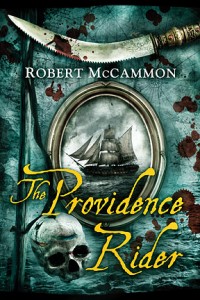
I’m sure other issues were involved, personal issues, because when he gave his farewell, he mentioned returning to family pursuits, being a father. That was admirable. Writing is a lonely task. You must spend long hours separated from others in order to think, create, and release pent-up, pulsating ideas onto paper.
Some of the articles I read about McCammon mentioned depression. Battling depression is as easy as standing on the beach and trying to hold back the waves of the ocean. I know because my father suffered with it before he died.
The more I read about Mr. McCammon, the more I respected him. And in his recent website article, “My Calling,” he openly discusses his absence and return. It takes a lot of courage to tell the world as he did that he had shortcomings and doubts about himself as a writer. Very few people will ever mention their shortcomings. But, read it yourself. There’s a lot you as a writer should digest.
I found myself making comparisons to Mr. McCammon. Okay, so I don’t have over 5 million of my books in print as he does, but there were some similarities. He gets his ideas from anywhere, even a dream. One of my books came from a dream. He doesn’t work from an outline. Neither do I. He sees the story in his head and writes what he sees. Well, ditto. Sometimes I’m surprised at what comes next as I write too.
Yes, Mr. McCammon, as you said, “…writing is the mystic journey that cannot be shared by anyone else… It is a solitary trip, with an uncertain destination.”
Robert R. McCammon is a fine man. I’m glad he’s off the Missing in Action list.
He’s the kind of man I’d enjoy sitting on the porch with, smoke a cigar and share some Jack Daniels, and have a leisurely conversation about the world in general—one of those talks where you right all the wrongs and walk away happy.
Until that day, all the best to you, sir.
Glenn
by Glenn | Mar 4, 2012 | MIA, Writing
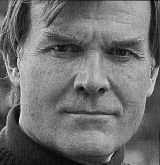
“MIA” Missing in Action: a casualty category assigned to the status of armed services personnel reported missing during active service, generally during combat environments.
Whenever asked what authors and books have made their greatest impression on me, I always answer: Nicholas Guild “The Assyrian,” Robert McCammon “The Wolf’s Hour,” Wilbur Smith “River God,” and David Morrell “First Blood.” Each is a highly acclaimed, award-winning, well-published author in his own right. Their combined books stacked one atop the other would be almost as tall as me. And no, I haven’t read every book they published, but have managed to read quite a few.
These are authors I respect for the depth of their research and unique qualities of writing. They have served as my mentors of the craft. Each year I pull out their books, reread them as if for the first time then reverently place them away until the next year. Finding some of these authors’ books in print today is almost impossible unless you wish to pay several hundred dollars (I searched the Internet for a copy of “The Assyrian” and it was selling for $360.) Fortunately, many of their books are returning to publication in eBook formats at lesser costs.
Wilbur Smith and David Morrell remain quite prominent in the public’s eyes today. They have websites and generously communicate with their readers, especially Mr. Morrell. Robert McCammon returned from a lengthy absence, is accessible to his fans, but more will be coming on this fine author in my next blog article, “Missing in Action, Part 2: Author Robert McCammon, “The Wolf’s Hour.” But what of Nicholas Guild?
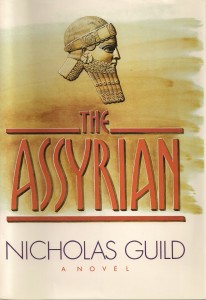
I recently completed a reading of “The Blood Star” (pub: 1989), the sequel to Guild’s “The Assyrian” (pub: 1987.) When you are wrapped within the intensity of a great author’s writings, you find yourself divided while reading their works. On one hand you anxiously devour each page, yet on the other, a sense of dread enters you because the last page is drawing near and the story will end. Nicholas Guild showed me how historical fiction should truly be written. For that I am eternally grateful.
From 1975 to 1995, Nicholas wrote 11 novels. His last work, “Angel,” supposedly contains a dedication to Susan Sheridan with a rather cryptic passage from Dante’s “Devine Comedy” that translated as best I can ascertain to, “…In the middle of the path in my life, I find myself in darkness…”
I found this odd, especially with it written on his last novel. Then my former police side kicked in with its questioning, investigative nature. So many years have passed without further word from Guild. I wondered where he was today. Why had he stopped writing? Why had he seemingly fallen off the ends of the earth? No man so prominent within a professional community as he was, vanishes without reason.
What began as a simple exercise to satisfy my curiosity quickly became an intriguing puzzle and analysis of a man’s mental state. With all of its pros and cons, the Internet is an amazing tool. I found his basic bio and assorted reviews of his novels. Guild obtained his PhD at the University of California at Berkeley in 1972 and as other authors have, moved on to become a professor of English Literature at a university. Connecticut was given as his last known residence where he was enjoying life with his family. Eleven novels, his writer celebrity growing, and all came to a screeching halt in 1995 after the release of “Angel”—then he vanished like a magician upon a stage who swirls a black cloak around himself and disappears before your eyes in a cloud of smoke.
I read articles and reviews about him until my head throbbed. I realized before me was the answer as to why he had stopped writing, only the water was too muddy for me to see through. Taking a walk to think, I recalled experiences with my agent and editors of publishing houses during the same period (80’s into the 90’s) that Guild was rising in public popularity. I remembered conversations with well-published friends and the industry stories they whispered as if spies were about us.
The publishing world may appear massive and magical from an everyday reader’s perspective but in actuality, it’s a small world where few secrets exist. Editors changed employment at the big houses so swiftly then that it became the norm. Most editors were quite young during that time, not long out of college, and believed they knew what the public truly wanted and how they thought. The big houses often played favorites with their authors which created dissension over matters such as advertising and printing runs. New book ideas were often killed by editors, and authors wanting to write in different genres were frowned upon, balked at, and argued against with fervor. There was often tight-fisted reign upon authors in terms of story revisions and the next book to be written. While some of these actions proved beneficial for the industry, others became detrimental. Such was the publishing world’s environment during those years. I hope it is different now.
But the muddy water began to sufficiently clear, allowing me to see possible reasons why such a gifted writer as Nicholas Guild had turned away from his talents and became missing in action. I jotted notes upon paper and began to study each:
- Had the depth of his research, thought, action, dialogue, and characters become so demanding that by the end of the book he was mentally drained? Once you read “The Assyrian” you will fully understand the intensity I speak of here.
- Did he want to break away from his original genre path but found confrontation with his publishers?
- Did it reach a point whereby editors were attempting to overly control his writings?
- Although his writings were well acclaimed, did he discover he was not equally favored by his publisher as they had provided for with other in-house authors?
- Were there physical illnesses, some medical issue such as cancer or Alzheimer’s Disease involved which forced him to abruptly stop writing?
- Or did he simply ‘burn out’ from the constant combat in mini-battles with publishers and chose to retreat into an educational world of literature where there appeared to be fresh air for the long term?
These are all assumptions on my part. There is nothing concrete to base an answer on. But my gut feeling tells me he willingly chose the fresh air at the cost of being declared missing in action.
Wherever you are, Mr. Guild, I wish you the best in all of your endeavors. If by some miracle you should ever read this, I respectfully say, “Thank you for being one of my mentors.”
Sincerely,
Glenn
by Glenn | Feb 18, 2012 | Writing

- “A gripping tale of a ship of doom….”
“The Black Witch” by Author Micheal Rivers
The gripping tale of a ship of doom…
First, understand I am not one who enjoys being at sea aboard a vessel of any size. I like the ocean and best appreciate it when viewed from shore. But I do enjoy a good nautical tale, especially one with a paranormal theme, and respect the addiction and love many hold for sailing the seas.
The descriptive depiction of the ship drew me into this story then the lure of the sea as felt by its seafaring crews came next. I was drawn into the seemingly hypnotic grip which the Black Witch laid upon all that neared her. Unique in build, a magnificent vessel with a truly mysterious background of fatal voyages, I soon discovered I wanted to learn more about the coming journey of the doomed, assorted passengers. With a ghostly foundation being well set by the author, I wondered how each would fare, curious what trials were to be set upon them.
The spectrum of characters is well balanced. Their diversity at first leaves you interested in how they will interface, yet by the novel’s end each retained an appropriate part in what became horrific experiences. Whether you believe in the devil or not, the demon that walks the ship plays havoc with your thoughts, leaving you disturbed at how he plies upon the weaknesses of mankind, taking pleasures as he desires against anyone’s will.
In truth, I became so absorbed in my reading at one point that I startled when my dog stood and nosed me for attention. I found myself wanting to know what lay next for the passengers and how much worse their plight could be—and when I believed I knew what might come, something different occurred to my surprise.
So for those readers who love an adventurous seafaring tale with a depth of paranormal blended tightly within, The Black Witch is worth the read. And if I were to ever buy a boat, which I doubt, it surely will not have the name “The Black Witch” painted along its sides.
Glenn Starkey
by Glenn | Feb 15, 2012 | interview, Writing
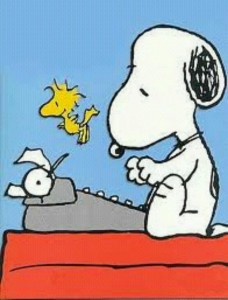
The Creative Mind
http://bookmarketingbuzzblog.blogspot.com/2012/02/interviews-with-publisher-literary.html
Interview With Novelist Glenn Starkey
What are the challenges of being a novelist today?
The greatest challenge is writing a novel worth reading. Accomplish this and the rest is procedural in terms of marketing your book. You can obtain help from mentors, friends and even hire people to promote your project, but if you do not have a book worth reading, you have no foundation to build upon.
What is your newest book? Why did you write it?
I am presently completing my first “sci-fi” based book “Amazon Moon.” As an action-adventure and historical fiction novelist, I wanted to challenge myself with a new creative path of writing — a hard hitting action-adventure that ends with a science-fiction twist. While some authors choose to remain within a single genre, I want to be known as an author that can cover a spectrum of writings and always turn out a quality story regardless of the genre.
What do you love most about being a published author?
I love writing a novel and receiving comments from men and women readers around the world telling me how much they enjoyed the story. When they begin telling me how much they loved the characters, the action, the storyline, and so forth, it truly makes my day! I then realize how I achieved my goals of being an author, capturing a reader’s soul, and making them want to read “one more page” before stopping for the day. I had one reader state, “I hate you!” Just that alone stunned me then I smiled as I read, “…you made me miss so much sleep because I loved your book and couldn’t stop until the end.”
Any advice for a struggling writer?
Honesty with yourself about your writing skills and perseverance in your efforts is important. First, study the craft by reading a wide variety of books in different genres. Second, write and complete your book before worrying about advertising, marketing, book sales and promotions. Third, get your book read by at least ten non-related people so you have a feel for your writing ability—and don’t argue with their review of your work. Analyze their comments and find the norm of problems they presented to you…then fix the problems whether it is your poor writing skills or a weak storyline. Fourth, be prepared for a bad review down the road. It doesn’t mean you are a bad writer. Remember, not everyone likes the same things in life.
Where do you see the book industry heading?
The first computers filled a room with their monstrous sizes and used IBM punch cards and reels of magnetic tape for their data. Fast-forward from that point and today your cellphone is a mini-computer with far more abilities. Your cellphone is a mini-computer. You can read a book or write one using your cellphone if you wish. Now look at the book industry. It has moved from ancient printing presses with all their labors to electronic distribution of books via “eBooks.” The evolutionary society we live in, courtesy of technological advancements, combined computers and the publishing industry so tightly that it leaves future developments a wide open race. We have become a demanding society which expects technology to continually change—and do so swiftly. There should always be readers and a demand for well written books, but the medium we will be using is anyone’s guess. I am of the generation that still loves to “hold” a book in hand, but my grandson will be of the generation that relates more to an eBook than a hard or soft cover novel. Neither is best or wrong; it is simply how we have evolved and what we have learned during growth.
For anyone in search of a definitive answer about the future of the industry, they will be disappointed to learn there is no set answer. There will be more of a lean toward electronics such as eBooks, but the love of physically holding a book will remain for several more generations. I do firmly believe though that “big house” publishers will gradually lose their domination over the publishing industry. I believe “indie-authors” and “indie-publishing” are forces to be reckoned with.
For more information about Glenn Starkey and Solomon’s Men, Year of the Ram, and The Cobra and Scarab: A Novel of Ancient Egypt, please consult: https://glennstarkey.net
by Glenn | Jan 10, 2012 | Writing
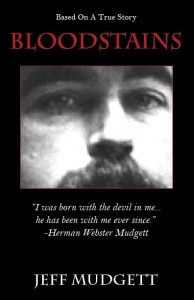 Review: “Bloodstains” Author: Jeff Mudgett
Review: “Bloodstains” Author: Jeff Mudgett
I received a copy of “Bloodstains” from a friend. My only knowledge of it was that the author was said to be the great-great-grandson of a man believed to have been Jack the Ripper.
As a former law enforcement officer my interest in the psychological makeup of serial killers and sociopaths was heightened by this book. I had read articles, books, watched movies and documentaries, and heard countless theories about the true “Jack.” Nothing seemed of a definitive nature to truly identify the infamous murderer and in all honesty, part of me doubted this writing would be any different. But, I remained open to all possibilities—and am glad I did. I wasn’t disappointed in the least.
In the prologue you are introduced to Herman Webster Mudgett, the great-great-grandfather. History knows him as Dr. H. H. Holmes, the infamous serial killer, yet calling him such does his pure evil little justice as you come to know him throughout the book. In the cover’s photo of Holmes’ eyes you sense he is devoid of emotion. It is the indifferent stare of a man who sets his own boundaries of humanity regardless of how degenerate they may be.
Within the first chapter you realize a dysfunctional chord runs throughout the Mudgett family. Bert, the grandfather, was a man who remained to himself: cold, hard, seemingly without love from his family, or displays of love to anyone. In life he was focused on his grandson, Jeff. Yet never was there outward affection a loving grandfather should have for a grandson. In death, he was only considered with disregard. Other family members have their problems as well, but it is Jeff’s introspection as an adult, his questions about lack of emotions, concerns about his lineage, his odd thoughts and such that becomes our focal point. And it is not until his father presents two boxes, items willed to Jeff by an uncaring grandfather that the true essence of the book begins to be revealed.
I now take absolute care in not writing any form of spoiler pertaining to “Bloodstains.” I state this because the story is well written, each page so masterfully woven with the next that I fear too much information could easily be divulged. But once the boxes were produced, my mind locked upon them, demanding to learn more.
The boxes contain two private journals of his great-great-grandfather, Herman W. Mudgett, aka Dr. H. H. Holmes. The journals are keys which unlock doors of knowledge that have never been ventured through since the beast closed them. And like Pandora’s Box, once the doors were opened, the evil within escapes.
This book is not for anyone with a weak constitution. It is not a graphically written horror story or tainted with pornographic flavor. But it will be disturbing, chilling, and emotionally destructive to the average person innocent of the mindsets and actions of serial killers. I also believe there will be readers who do not complete the book simply because it evokes such a spectrum of horrid mental images.
You follow Jeff’s plight and struggle with his bloodline demon. You begin to learn information which contradicts other writings about H. H. Holmes, about Jack the Ripper, yet you will find yourself nodding agreement that this is plausible and sickeningly truthful. There will be moments of doubt and confusion, and you will wonder about Jeff’s own degree of sanity, but the threads of the story are so tightly woven that soon its full tapestry, however macabre, comes clearly into view.
Could a demon have risen from the entries of a murderer’s journal, infect and disease Jeff’s soul as it did, especially with the writer being his lineage? Such a question is one each individual must answer for themselves. After having spent time as part of a paranormal investigative team and researched related subject matter through the years, I would not cast it all aside as foolishness. After all, the Catholic Church still performs exorcisms.
The presentation of Dr. H. H. Holmes in “Bloodstains” rightfully depicts a man as heartless as Vlad the Impaler, but displays a level of intelligence worthy of acknowledgment in the field of medicine. This acceptance of his dual nature creates conflict with a reader because you want to see him solely as a wrong-doer, not one involved with academic scientific pursuits.
When the last page was read, I sat in silence, debating my new concerns with all the tales about Jack the Ripper. Within the book I had viewed Jeff’s internal struggle with a demon so vile Hannibal Lecter paled in comparison to, and realized once more the mind still retains unexplored regions. I was relieved though that a troubled grandfather at last received his worthy redemption. And when I closed the book, I felt it remain in my thoughts for many hours.
“Bloodstains” is well written—no, it is masterfully written. Jeff Mudgett has bared himself for all to see, whether good or bad, presenting the reader with a turbulent story that allows for personal acceptance or denial. I give this book the highest marks for the depth its journey carries a reader. Everyone has skeletons in their family closet. Unfortunately, some have demons.
Glenn
@GStarkeyBooks
by Glenn | Jan 3, 2012 | Writing
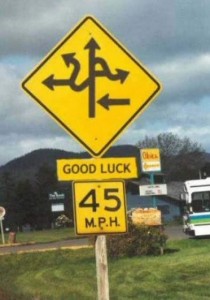 Yes, that is my current status. The holidays are behind us and a new year is here. I’m sitting in my office, drinking coffee and staring at “Willie” (my Labradoodle), wondering what I should do next. Okay, I know my desk is here, somewhere, even though it’s buried beneath an avalanche of papers, business cards, and small boxes. I should clean it. But I also need to play ‘catch-up’ with backlogged correspondence, file some documents, make data entries for income tax purposes, review today’s marketing numbers of my books, and considering I am a novelist – actually work on my current novel. Of course I cannot forget the tribulations of daily life mixed in as well; to-do lists, gym time, car problems, house maintenance repairs, and filling the holes in the yard that Willie dug last night.
Yes, that is my current status. The holidays are behind us and a new year is here. I’m sitting in my office, drinking coffee and staring at “Willie” (my Labradoodle), wondering what I should do next. Okay, I know my desk is here, somewhere, even though it’s buried beneath an avalanche of papers, business cards, and small boxes. I should clean it. But I also need to play ‘catch-up’ with backlogged correspondence, file some documents, make data entries for income tax purposes, review today’s marketing numbers of my books, and considering I am a novelist – actually work on my current novel. Of course I cannot forget the tribulations of daily life mixed in as well; to-do lists, gym time, car problems, house maintenance repairs, and filling the holes in the yard that Willie dug last night.
So, what comes first? How do I develop a daily work schedule which allows me to accomplish a multitude of tasks? Have you found yourself in this writer’s quagmire? Anyone have a magic answer? If so, I’m open to suggestions.
Recently while reading various postings from writers, I’ve seen a common complaint about having too many websites to monitor, i.e., Facebook, Twitter, Linkedin, Goodreads, and dozens more. These sites devour a majority of your time with marketing postings and responses to their internal writing groups. Some authors have stated they are reducing their activities on several sites to allow better focus on their projects. I agree. There are almost too many social media activities. Like the old saying goes, “Too much of a good thing can become bad.” But which sites will serve an author best? And for what reasons?
I know I’m not the only one weighing all of these factors in order to find a balance in life. I would love to hear some of the “tricks of the trade” from seasoned writers and everyone in general. Meanwhile, I better put on another pot of coffee because I can already see this is going to be a long day.
Glenn
@GStarkeyBooks
Photo credit: Unknown, Internet.










